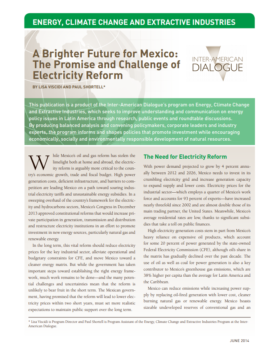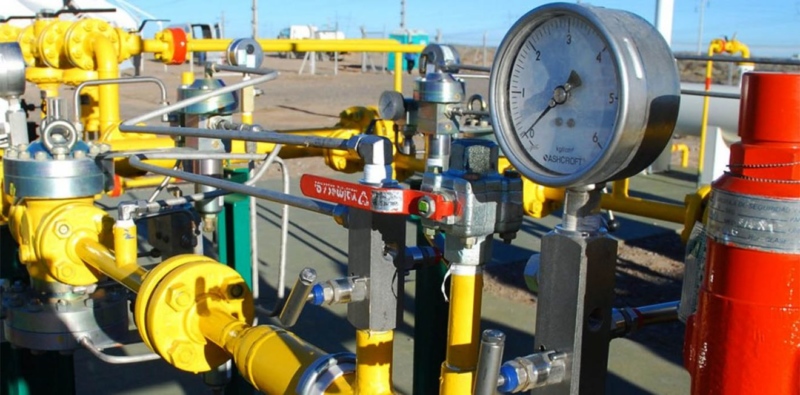
The Promise & Challenge of Electricity Reform in Mexico
While Mexico’s oil and gas reform has stolen the limelight, the electricity reform is more critical to the country’s economic growth.
A Daily Publication of The Dialogue
A Chilean delegation led by President Gabriel Boric met with Argentine President Alberto Fernández and other top officials on April 4 in Buenos Aires to discuss closer energy cooperation. The neighboring countries signed an agreement for new collaboration in energy, including increasing Argentine exports of liquefied natural gas and oil to Chile, and the reopening of the Neuquén-Biobío pipeline. What are the most important areas for energy cooperation between the two countries, and how much does the latest accord achieve toward advancing them? How critical is the rehabilitation of the Argentina-Chile natural gas pipeline, and how much investment will that project take? How will increased energy trade affect high fuel prices in Chile and Argentina? Will importing more fossil fuels into Chile complicate Boric’s renewable energy transition agenda?
Ezequiel Fernández, research director at Balanz: “The focus of the energy talks between Boric and Fernández seemingly revolved around the usual desire for potential increases in Argentine hydrocarbon exports to Chile. Sending Vaca Muerta gas over the Andes is already helping Argentina with hard currency needs, while Chile benefits from sourcing cheaper-than-LNG fuel. More abundant and consistent gas flows between the two countries would be great, but the truth is that Argentina is already exporting as much gas to Chile as it can. A significant expansion beyond the 6,000-cubic-meters-per-day summertime volumes would require expanding interconnecting pipes, sizable midstream upgrades in Argentina (some on the way), the expiration of existing LNG contracts in Chile and much faith in the sanctity of new bilateral contracts. This looks like too much for Argentina to pull off, and Chilean off-takers have not forgotten their traumatic 2007 experience with Argentine gas. On the oil side, reviving the 100,000 bpd pipeline connecting the Neuquén oil hub with the ENAP refinery in the Biobío looks simpler, even if the idea is far from new. It would require a $75 million capital expenditure effort, and it does make a lot of economic sense, but tackling such works requires certainties on Argentina achieving sustainable export surpluses of crude oil. The recent productivity improvements at Vaca Muerta suggest that this is now more feasible, but we know how fast scenarios change in Argentina. Overall, it was nice to see the neighborly handshaking in Buenos Aires, but until Argentina fixes its most pressing macroeconomic issues, the bilateral energy agenda will likely remain short-term focused and of limited scope.”
Roland Huxley, lead specialist, and Macarena Michienzi, specialist, in public policy, risk and strategy at Cefeidas Group in Buenos Aires: “The agreement signed by Chile and Argentina represents a step forward on energy cooperation following the resumption of Argentine gas exports to Chile in 2018, and it advances both countries’ objectives in the energy sector. First, increased oil and gas exports will provide Argentina with vital foreign currency to bolster the central bank’s limited reserves. It will also help Argentina to cut expenditures in order to meet the objectives established in the agreement to refinance its debt with the IMF. Increased gas exports are in line with Argentina’s ‘Gas.Ar’ plan, which aims to significantly increase gas production and achieve a gas surplus, particularly in the summer when domestic consumption is lower. The deal also opens the possibility of Argentine access to Chile’s Pacific ports, thereby facilitating the export of oil and gas to the lucrative Asian market. From a Chilean perspective, guaranteed access to Argentina’s extensive oil and gas reserves is a significant development for a country that is heavily dependent on imports to meet local demand. Although President Gabriel Boric made a campaign pledge to fully decarbonize energy generation by 2030, roughly 40 percent of Chile’s energy is currently generated by coal, and Argentine natural gas represents a lower-carbon alternative to complement its transition to renewables. Nevertheless, the agreement also establishes the rehabilitation of the Neuquén-Biobío oil pipeline, set to be fully operational by 2023, and it is less clear how daily imports of up to 110,000 barrels of oil per day align with Boric’s climate goals.”
Schreiner Parker, senior vice president and head of Latin America at Rystad Energy: “The meetings earlier this month between presidents Boric and Fernández, and their respective ministers, certainly go a long way to demonstrate the solidarity between ideological allies on the continent. Although politics may have spurred this initiative, its underlying rationale is expressed in geography and geology. Although tumultuous at times, there is a longstanding energy relationship between Chile and Argentina based on the fundamentals of supply and demand--that is, Argentina has supply and Chile has demand. As President Boric continues his efforts in the decarbonization process of Chilean electricity generation, natural gas from Argentina will play a pivotal transition role, even as his ultimate goals may be loftier. A small but growing percentage of Chilean natural gas demand is met by Argentine piped gas, which, along with their long-term contracted LNG volume structure, has shielded them from the radical rise in LNG prices. Chile will look to capitalize on a surge in Vaca Muerta gas production and create some ‘security of supply,’ with Argentine volumes being seen as reliable and cheaper still than even the long-term contracted LNG. The Argentines as well will benefit from this closer relationship. With limited road and pipeline infrastructure, Vaca Muerta still deals with takeaway capacity issues. The revamping of the Neuquén-Biobío pipeline will alleviate that export pressure to the tune of 100,000 bpd. For the Fernández government, the bigger prize may lie in LNG. The idea of a cross-border LNG liquefaction and feedstock project has been around for some time but is fraught with above-ground complexities and has not been done before globally. A tighter relationship between these two governments may help ameliorate some of that anxiety, but further steps are needed before Argentina can realistically think about being an LNG exporter through Chile.”
Gerardo Rabinovich, vice president of the Argentine Institute of Energy ‘General Mosconi': “In their recent meeting, the presidents of Chile and Argentina agreed to continue cooperating in the areas of oil and natural gas. The history of energy cooperation between Argentina and Chile has had pronounced ups and downs. In 2004, faced with the natural gas supply crisis in Argentina, then-President Cristina Fernández de Kirchner decided to cut gas contracts between the two countries that had been signed at the end of the last century. This caused strong tensions that marred relations between the two countries for many years. In 2017, energy exchanges were restored with specific exports of natural gas from Chile to Argentina, slightly overcoming the distrust that the previous events generated. Argentina will have significant fuel shortages this winter, and cooperation will be needed for energy security on both sides of the border. The energy vulnerability of both countries is critical because of the war in Europe, so the increase in oil and natural gas trade benefits both. The agreements are a positive sign that the two countries are on a path toward regional integration, which is necessary if energy transition demands are to be met.”
Fermín Koop, Latin America editor for the Southern Cone at Diálogo Chino: “Chilean President Gabriel Boric’s recent trip to Argentina to meet with President Alberto Fernández was Boric’s first trip outside Chile since taking office last month. Energy was at the top of the agenda amid the disruption to the global energy market caused by Russia’s invasion of Ukraine. Both countries signed a joint declaration addressing issues of integration and bilateral energy cooperation. Talks included the commercialization of natural gas, Argentine exports of liquefied natural gas and oil, the rehabilitation of the Neuquén-Biobío pipeline and energy transition, among other topics. Chile and Argentina agreed on the importance of natural gas as a part of the gradual energy transition, arguing that it’s necessary to provide more flexibility and security to energy systems. They will work collaboratively to increase energy exports and imports between both countries. Argentina has long backed the use of natural gas for its energy transition amid a slow expansion of renewable energy. Meanwhile, Chile has a medium-term plan in place to close all its coal-fired energy plants by 2040. This is possible largely thanks to an expansion of solar and wind plants as well as gas imports.”
James F. Channing, international associate at Hunton Andrews Kurth LLP, and a member of the Chilean bar: “Traditionally (and still the case), energy cooperation between Chile and Argentina has been based on the abundance of oil and gas in Argentina, and the lack of such resources in Chile. Given the ambitious energy transition and decarbonization goals of Chile – which aims to close its coal power plants in the near future – and current worldwide events, natural gas should have an important role to play supplementing renewables, which already account for 35 percent of Chile’s power. The latest accord confirms the intentions of Chile and Argentina to increase their oil and gas trading. Separately, the accord cites the need for increased cooperation with respect to renewables, energy efficiency and integrated infrastructure such as transmission lines. Chile and Argentina share extensive renewables resources and Chile has taken a lead in the development of low carbon hydrogen. Consequently, there is room for cooperation, especially considering Chile’s access to the Pacific Ocean and potential exports of hydrogen derived products to Asia and Australia. The terms of the accord appear to be aligned with Chile’s energy transition policies and therefore should not contradict President Boric’s agenda which is focused on increasing renewables and closing coal fired plants (both of which goals should result in increased demand for natural gas imports). However, notwithstanding stated intentions in the accord, both countries may still face challenges attracting the private investment and financing necessary for these types of capital-intensive projects given the uncertainty surrounding the constitutional process currently taking place in Chile, and the business and legal environment of Argentina.”
 The Latin America Advisor features Q&A from leaders in politics, economics, and finance every business day. It is available to members of the Dialogue’s Corporate Program and others by subscription.
The Latin America Advisor features Q&A from leaders in politics, economics, and finance every business day. It is available to members of the Dialogue’s Corporate Program and others by subscription.
While Mexico’s oil and gas reform has stolen the limelight, the electricity reform is more critical to the country’s economic growth.
On March 7th, the Inter-American Dialogue and CAF-Development Bank of Latin America organized a roundtable with a diverse group of experts to provide input for a forthcoming report on US investment in Latin American energy.
Brazil is on track to double its oil and gas production following a series of energy policy reforms aimed at increasing investment.
 Argentina will boost shipments of oil and natural gas to Chile as part of a bilateral agreement made between the two neighboring countries on April 4. A natural gas pipeline in Argentina’s Neuquén basin is pictured. // File Photo: Argentine Government.
Argentina will boost shipments of oil and natural gas to Chile as part of a bilateral agreement made between the two neighboring countries on April 4. A natural gas pipeline in Argentina’s Neuquén basin is pictured. // File Photo: Argentine Government.

